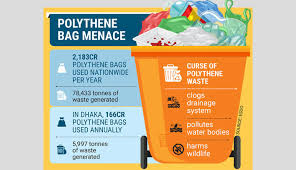Ban of polythene raises hope to paper packaging entrepreneurs
- Update Time : Wednesday, October 16, 2024

TDS Desk
The recent ban on polythene shopping bags has provided a significant boost to small entrepreneurs, particularly those involved in the production of ecofriendly paper-based packaging.
As the country continues its efforts to combat environmental pollution, the shift towards sustainable packaging solutions is opening new opportunities for local businesses, said experts.
The government’s renewed enforcement of the ban, originally imposed in 2002 but only sporadically enforced, is aimed at reducing plastic waste that clogs drainage systems, pollutes water bodies, and harms wildlife.
With the demand for alternatives skyrocketing, small and medium enterprises (SMEs) specializing in paper-based and biodegradable packaging are set to reap the benefits.
The government imposed a complete ban on polyethene or polypropylene-based materials like shopping bags in supermarkets from 1 October.
The ban will be extended to traditional markets from November 1. This initiative aims to reduce environmental damage and promote sustainable practices.
The super shops have already started using paper bags instead of polythene bags for providing vegetables, sugar, rice and other products.
At the Mirpur-10 branch of Shwapno Supermarket, vegetables and other items are now being provided in paper bags. As an alternative, the supermarket is selling jute and fabric bags at affordable prices.
Aminul Islam, a shopper at the store, expressed his support for the polythene ban and termed it a timely initiative. Paper bag manufacturers and sellers, many of whom operate small-scale businesses, are gearing up to meet the growing demand.
“The ban on polythene has opened up a huge market for us. We are getting more orders with the implementation of the ban in supermarkets,” said Md Raju, a paper bag and package producer at Mirpur-12.
“I have been running a business of making paper packages since my childhood as my father was also conducting the business. The demand for the paper package was high at that time but polythene gradually grabbed the market,” he said.
“Seven women work to make paper packages for my factory. They took paper from the factory and made packages at their home, earning around Tk200-Tk300 per day based on the number of packets they made,” said Raju.
They are already receiving orders from various retailers who want to switch to eco-friendly packaging, which will help them expand business and create more jobs, he said.
“We produce packets of different sizes like 250gm, 500gm, 1.25kg and 2.5kg. The price of 250gm of packaging items is Tk280, 500gm is Tk380, 1.25kg is Tk480 and 2.5kg is Tk780. We use mainly crepe paper, brown paper, offset paper and some other papers to make the packages and envelopes,” said the trader.
An assessment found that more than 2,183 crore polythene bags are used nationwide, generating about 78,433 tonnes of waste. In Dhaka alone, 166 crore polythene bags were used annually and these immense usages generate around 5,997 tonnes of illegal polythene bag waste, according to the Environment and Social Development Organization (ESDO).
ESDO Secretary General Dr Shahriar Hossain said, “Not only will this move significantly reduce environmental damage, but it will also pave the way for the growth of local industries producing sustainable products. The paper packaging industry has the potential to generate thousands of jobs and provide income to small businesses and entrepreneurs across the country.”
“It will not only generate employment but also influence the country’s economy. Health hazard and environmental pollution will be reduced with this,” he said.
“The ban will expand across the country and increase the use of paper packages, bags, clothing bags and jute bags. For this, small entrepreneurship to make those products will increase. With this, employment opportunities for thousands of people will be created in this sector,” said the expert.
He said the government should give some incentive and easy loan facilities in this sector. “It will create additional income for the lower and middle-income groups,” he said.
Moreover, the ban encourages innovation in packaging materials. Entrepreneurs are now exploring options such as jute-based packaging and other biodegradable alternatives.
Many small manufacturers are receiving technical and financial support from non-governmental organisations and government agencies, helping them upgrade their production processes to meet the growing demand for sustainable packaging.
As more businesses and consumers adopt environment-friendly alternatives, small entrepreneurs across Bangladesh are hopeful that this shift will not only help reduce pollution but also contribute to economic growth by creating new jobs and income opportunities in the green sector.
















